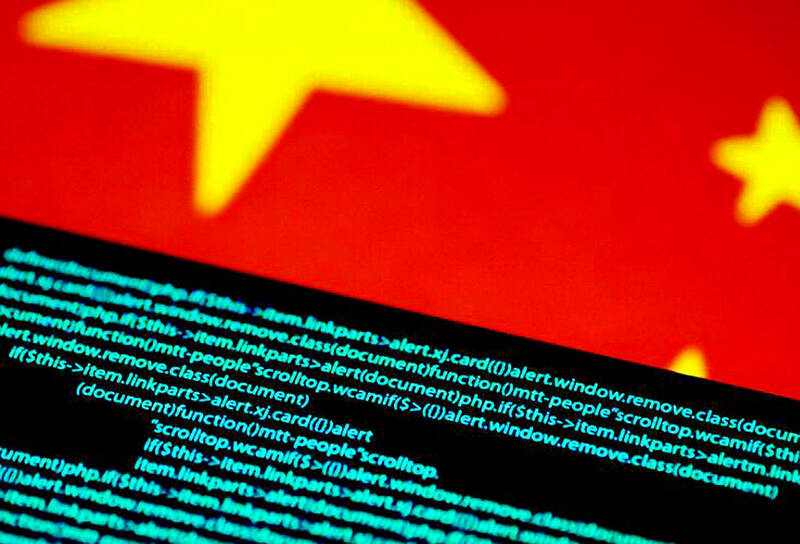Scientists and researchers participating in projects that would be launched under the soon-to-be established Taiwan Academic Cybersecurity Center must not have participated in studies or projects funded by the Chinese, Hong Kong or Macanese governments, the Executive Yuan said.
The center, which is to be operated by the National Science and Technology Council, is part of Taiwan Information Security Excellence Program approved by the Executive Yuan.
It is to set up branch offices at universities and focus on researching information security issues. Preparations to launch the center are to begin next month.

Photo: Reuters
SEVEN KEY AREAS
Based on the council’s plan, the center is to target research in seven key areas: artificial intelligence information security, satellite security protection, chip security, post-quantum cryptography, zero trust architecture, resilient networks and next-generation mobile network security.
The council said it would use Taiwan’s advanced semiconductor industry to develop information security technologies, including in authentication, identification and encryption.
Technical verification would be conducted at the Shalun Information Security Service Base in Tainan, it said.
SECURITY REQUIREMENTS
The council would require that project hosts and cohosts as well as full-time personnel on research projects have never participated in research or subsidy programs run by China, Hong Kong or Macau.
They must also have not held teaching positions in China, Hong Kong or Macau in the past five years, including full-time and part-time positions.
All participants in the center’s projects must not have Chinese, Hong Kong or Macanese citizenship, and must not have studied for a degree in China.
The US Department of Commerce is reportedly to organize an information security-related delegation to Taiwan in September.
HIGH VALUE
The output value of Taiwan’s asset security reached NT$60.35 billion (US$1.97 billion) in 2021, and the compound annual growth rate of the asset security output value from 2016 to last year was 11.3 percent, Executive Yuan data showed.
The nation has 50 manufacturers of information security-related products and services, which employ about 9,000 workers.
The structure of the information security industry shows that hardware accounts for 51.3 percent, software accounts for 9.1 percent and services account for 39.6 percent.

MORE VISITORS: The Tourism Administration said that it is seeing positive prospects in its efforts to expand the tourism market in North America and Europe Taiwan has been ranked as the cheapest place in the world to travel to this year, based on a list recommended by NerdWallet. The San Francisco-based personal finance company said that Taiwan topped the list of 16 nations it chose for budget travelers because US tourists do not need visas and travelers can easily have a good meal for less than US$10. A bus ride in Taipei costs just under US$0.50, while subway rides start at US$0.60, the firm said, adding that public transportation in Taiwan is easy to navigate. The firm also called Taiwan a “food lover’s paradise,” citing inexpensive breakfast stalls

TRADE: A mandatory declaration of origin for manufactured goods bound for the US is to take effect on May 7 to block China from exploiting Taiwan’s trade channels All products manufactured in Taiwan and exported to the US must include a signed declaration of origin starting on May 7, the Bureau of Foreign Trade announced yesterday. US President Donald Trump on April 2 imposed a 32 percent tariff on imports from Taiwan, but one week later announced a 90-day pause on its implementation. However, a universal 10 percent tariff was immediately applied to most imports from around the world. On April 12, the Trump administration further exempted computers, smartphones and semiconductors from the new tariffs. In response, President William Lai’s (賴清德) administration has introduced a series of countermeasures to support affected

CROSS-STRAIT: The vast majority of Taiwanese support maintaining the ‘status quo,’ while concern is rising about Beijing’s influence operations More than eight out of 10 Taiwanese reject Beijing’s “one country, two systems” framework for cross-strait relations, according to a survey released by the Mainland Affairs Council (MAC) on Thursday. The MAC’s latest quarterly survey found that 84.4 percent of respondents opposed Beijing’s “one country, two systems” formula for handling cross-strait relations — a figure consistent with past polling. Over the past three years, opposition to the framework has remained high, ranging from a low of 83.6 percent in April 2023 to a peak of 89.6 percent in April last year. In the most recent poll, 82.5 percent also rejected China’s

PLUGGING HOLES: The amendments would bring the legislation in line with systems found in other countries such as Japan and the US, Legislator Chen Kuan-ting said Democratic Progressive Party (DPP) Legislator Chen Kuan-ting (陳冠廷) has proposed amending national security legislation amid a spate of espionage cases. Potential gaps in security vetting procedures for personnel with access to sensitive information prompted him to propose the amendments, which would introduce changes to Article 14 of the Classified National Security Information Protection Act (國家機密保護法), Chen said yesterday. The proposal, which aims to enhance interagency vetting procedures and reduce the risk of classified information leaks, would establish a comprehensive security clearance system in Taiwan, he said. The amendment would require character and loyalty checks for civil servants and intelligence personnel prior to